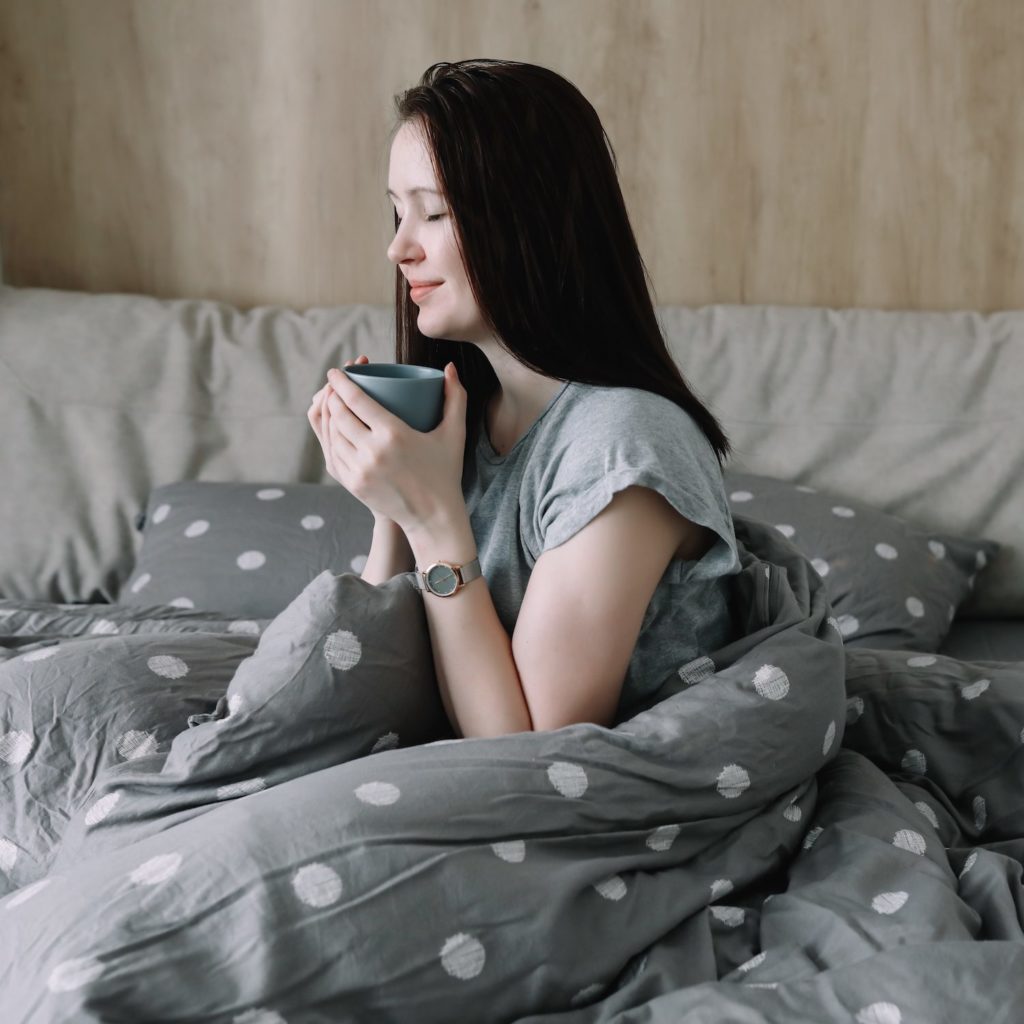A nutritious diet and quality sleep are both essential for optimal health. But when it comes to getting a good night’s rest, certain foods may be better than others. We take a closer look at which foods and nutrients may promote better sleep.
Kiwis
First grown in China and now a worldwide phenomenon, kiwis are packed with nutrients like vitamin C, potassium, vitamin E, and folate. These small fruits have been studied for their potential benefits to digestion, immune health, and sleep. Kiwi may improve sleep due to the fruit’s high serotonin content. Serotonin is a substance crucial to many processes in the brain, including the production of melatonin, a hormone that helps regulate when you sleep. The sleep benefits of kiwi may also be due to the fruit’s high concentration of antioxidants and folate. Eating kiwis prior to bed may even help people with sleep disorders improve their sleep. Studies suggest that kiwi may help people with sleep disorders fall asleep more quickly, sleep longer, and wake up less often during the night.
Tart Cherries and Tart Cherry Juice
There are more than 100 varieties of cherries, each containing nutrients like vitamin C and potassium. Cherry varieties are separated into two groups, sweet cherries and tart cherries, and may be consumed raw, cooked, or juiced. Research suggests that eating tart cherries and drinking tart cherry juice may enhance sleep. Several varieties of tart and sweet cherries contain high levels of both melatonin and serotonin, which may contribute to their sleep benefits. Consuming tart cherries may help people stay asleep longer. Other benefits of tart cherries include falling asleep more quickly and waking up less frequently during the night.
Other Fruits and Vegetables
Research has found that people who eat more servings of fruits and vegetables may sleep longer and get more restful sleep than those who eat fewer fruits and vegetables. Fruit and vegetable consumption has also been linked to better sleep quality and a reduced risk of insomnia. While it is difficult for researchers to pinpoint the exact reason for the sleep-promoting benefits of fruits and vegetables, a variety of these foods contain melatonin and some fruits and vegetables contain higher amounts of the hormone than others. Many fruits and vegetables with high melatonin content can easily be found at the grocery store, like grapes, strawberries, tomatoes, and peppers.
Milk
Dairy milk is an important source of calcium, which promotes healthy bones and reduces the risk of osteoporosis. Cow’s milk is also rich in tryptophan and vitamin D, both of which are linked to better sleep. While research is ongoing, studies suggest that people who eat a well-rounded diet that includes milk and other dairy products may have better sleep quality.
Fatty Fish
Fish contain protein and provide a variety of nutrients like iron, zinc, vitamin B12, and choline. Eating certain varieties of fish that contain high levels of fat is associated with better sleep quality. Types of fatty fish include:
- Salmon
- Mackerel
- Herring
- Orange roughy
- Tuna
- Sardines
Fatty fish are also rich in omega-3 fatty acids and vitamin D, both of which may help the body regulate sleep due to their effect on the regulation of serotonin. Some research suggests that a diet lacking in omega-3s may negatively affect the sleep-wake cycle and lead to interrupted or disturbed sleep.
Nuts
Nuts are a rich source of fiber, vitamins, and minerals. While many varieties of nuts contain nutrients that could affect sleep, more research is needed to understand whether eating nuts can help improve sleep. Many types of nuts and seeds contain melatonin and other nutrients commonly associated with improved sleep like omega-3 fatty acids, zinc, and tryptophan.
- Walnuts: Walnuts have a relatively high melatonin content and are a source of omega-3 fatty acids.
- Pistachios: Pistachios have one of the highest melatonin levels of any nut, though there is little research on how pistachios may affect sleep.
- Almonds: Almonds have notable amounts of zinc and melatonin. These popular nuts also contain some magnesium. Though not much is known about how magnesium affects sleep, low magnesium levels are associated with difficulty falling asleep and staying asleep.
- Pumpkin seeds: Pumpkin seeds have high levels of zinc and magnesium and are a good source of tryptophan.
Whole Grains
Grains contain important nutrients that support physical health. Grain-based foods are classified as containing either refined grains or whole grains. Whole grains contain the plant’s entire kernel, while refined grains are processed to remove part of the kernel to create a finer texture and increase the product’s shelf-life. In removing part of the kernel, refined grains lack some of the nutrients contained in the whole grain. Common whole grains include:
- Whole-wheat flour
- Bulgur (cracked wheat)
- Oatmeal
- Brown rice
Two sleep-promoting nutrients contained in whole grains are melatonin and zinc. Research suggests that eating more whole grains may reduce the risk of insomnia, while eating more refined grains may have the opposite effect, increasing a person’s risk of insomnia.
Herbs and Herbal Tea
Herbs have been recognized for their therapeutic attributes for thousands of years. Herbs are portions of plants collected for their taste, smell, or medicinal qualities. These plant products may be consumed as teas, capsules, powders, and other preparations. Many herbs have been studied for their role in promoting sleep. Some experts hypothesize that these herbs may help regulate sleep through affecting the regulation of GABA, a chemical messenger in the body.
- Chamomile: Chamomile is often promoted for relaxation. Though it has not been thoroughly tested, some studies have suggested that chamomile may improve sleep quality and decrease anxiety.
- Lavender: Lavender is often used as a scent for relaxation and sleep, but it is generally considered safe to consume in small amounts. There is some evidence that lavender scent increases melatonin levels.
- St John’s Wort: St. John’s Wort has very high levels of melatonin in its flowers and leaves. However, this herb should be used with caution as it may interact with a variety of medications, such as antidepressants or birth control pills.
- Valerian: Researchers have investigated valerian for its benefit in promoting sleep. Studies of valerian for insomnia have largely been inconclusive, though some research suggests that valerian may reduce insomnia symptoms.
Although many people use herbs to benefit their health, there may be risks to using certain herbs. Before taking any herbs or supplements that claim to promote sleep, it is important to speak with a medical professional.
Worst Foods for Sleep
While some foods may benefit sleep, other foods can make it harder to fall asleep and stay asleep through the night. Foods that may negatively affect sleep include meat and foods that contain alcohol or caffeine.
- Meat: Meat is a rich source of protein. While the effects of dietary proteins on sleep are still unclear, early studies suggest that sleep quality may be worse in people who eat higher quantities of meat.
- Alcohol: Alcoholic beverages may make it easier to fall asleep, but drinking alcohol is also connected to sleep interruptions during the night.
- Caffeine: Caffeine is a stimulant found in foods like chocolate and beverages such as coffee, tea, and energy drinks. The energizing effects of caffeine may be felt for up to eight hours. People who drink caffeine may take longer to fall asleep, may not sleep as long, and may experience reduced sleep quality.
How Does Nutrition Affect Sleep?
The relationship between nutrition and sleep is complex. While there is a wealth of research on the effects of specific diets and foods on sleep, it is difficult to draw clear conclusions about how a particular food or diet will impact an individual’s health. Providing clear information about the links between diet and sleep is challenging due to the inherent difficulties of conducting nutrition research and because individual factors like digestion and metabolism play an important role in how a person’s diet affects their sleep. Research has shown that a healthy diet that includes a range of nutrients is necessary for the body to function properly. Diets that are limited in certain nutrients, such as vitamins and minerals, are linked to insufficient sleep. People should speak with a health care professional before making significant changes to their diet. A health care professional can discuss the risks and benefits of dietary changes and may have suggestions for other strategies to improve sleep, like tips for better sleep hygiene.
How Sleep Impacts Your Food Choices
Getting the right amount of quality sleep is important for memory, reasoning, mood, and overall health. People who do not get enough sleep may experience daytime sleepiness or irritability, and may find it difficult to make healthy food choices. Studies suggest that people who sleep fewer hours are more likely to engage in unhealthy eating habits and consume fewer fruits and vegetables. Evidence suggests that, without enough sleep, people are also more likely to eat high-fat foods and carbohydrates with added sugars that are lacking in vitamins and other nutrients.
Nutrition Tips for Improved Sleep
Though more research is needed to fully understand the complex links between food and sleep, research suggests certain dietary strategies may help improve your sleep.
- Eat more fruits and vegetables: Eating more fruits and vegetables may improve the quality of your sleep in addition to providing important nutrients and lowering your risk of chronic diseases.
- Limit caffeine and sugar: Be mindful of the quantity and timing of caffeine and sugar consumption. Foods with added sugar or caffeine may have a negative effect on sleep.
- Avoid large meals prior to bed: A light snack is fine before bed if you feel hungry. Eating a large meal can cause indigestion and discomfort that could make it difficult to sleep.
- Talk with your doctor: If you are considering a change in diet or are concerned that your current diet may be affecting your sleep, talk with your doctor. They can talk with you about dietary changes and help you find evidence-based information about improving your sleep.
References
Ask the Sleep Doctor
Have questions about sleep? Submit them here! We use your questions to help us decide topics for articles, videos, and newsletters. We try to answer as many questions as possible. You can also send us an email. Please note, we cannot provide specific medical advice, and always recommend you contact your doctor for any medical matters.





